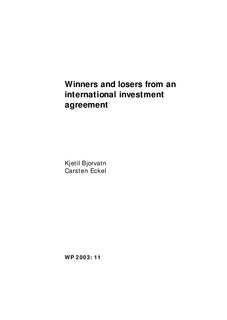| dc.contributor.author | Bjorvatn, Kjetil | |
| dc.contributor.author | Eckel, Carsten | |
| dc.date.accessioned | 2008-02-22T12:37:25Z | |
| dc.date.accessioned | 2017-03-29T09:12:09Z | |
| dc.date.available | 2008-02-22T12:37:25Z | |
| dc.date.available | 2017-03-29T09:12:09Z | |
| dc.date.issued | 2003 | |
| dc.identifier.isbn | 82-8062-059-1 | |
| dc.identifier.issn | 0804-3639 | |
| dc.identifier.uri | http://hdl.handle.net/11250/2435761 | |
| dc.description.abstract | Recent attempts at reaching an international investment agreement have been met with considerable opposition and failed. An important reason for this failure is the diverging interests between the parties involved. The present paper focuses on the interests of host countries, with difference in market size as the source of conflict. We analyse the welfare effects of an international investment agreement as a function of the intensity of technological spillovers, the technology gap between the investor and host country firms, intra-regional trade costs, and the difference in market size. | |
| dc.language.iso | eng | |
| dc.publisher | Chr. Michelsen Institute | |
| dc.relation.ispartofseries | CMI Working paper | |
| dc.relation.ispartofseries | WP 2003: 11 | |
| dc.subject | International agreements | |
| dc.subject | Foreign direct investment | |
| dc.subject | Technological spillovers | |
| dc.subject | Investment policy | |
| dc.subject | Welfare effects | |
| dc.title | Winners and losers from an international investment agreement | |
| dc.type | Working paper | |
